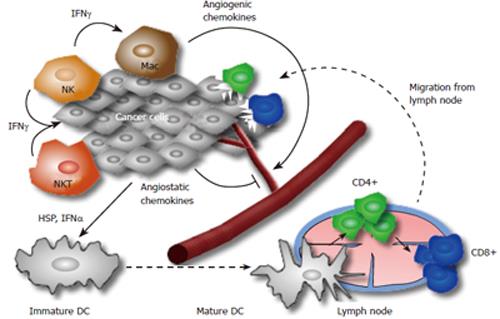Copyright
©2006 Baishideng Publishing Group Co.
World J Gastroenterol. Dec 7, 2006; 12(45): 7233-7238
Published online Dec 7, 2006. doi: 10.3748/wjg.v12.i45.7233
Published online Dec 7, 2006. doi: 10.3748/wjg.v12.i45.7233
Figure 1 A proposed model for the host immune reaction to cancer cells.
At the initiation of the immune reaction lymphocytes and other cells participating in innate immunity (e.g. APCs, NK, NKT cells) recognize transformed tumor cells and produce IFN-γ. This starts a cascade of reactions with production of chemokines (for instance angiogenic or angiostatic chemokines like MIG, IP10 and I-TAC), IFN-γ (antiproliferative mediator for the developing tumor) and direct cytotoxicity of NK cells and macrophages on tumor cells. This cascade may result in partial tumor cell death and tumor cell debris is ingested by dendritic cells, which move to draining lymph nodes and activate CD4+ and CD8+ T cells. Activated and tumor specific T cells move to the tumor along a chemokine gradient and destroy tumor cells expressing a distinctive tumor antigen.
- Citation: Waldner M, Schimanski CC, Neurath MF. Colon cancer and the immune system: The role of tumor invading T cells. World J Gastroenterol 2006; 12(45): 7233-7238
- URL: https://www.wjgnet.com/1007-9327/full/v12/i45/7233.htm
- DOI: https://dx.doi.org/10.3748/wjg.v12.i45.7233









